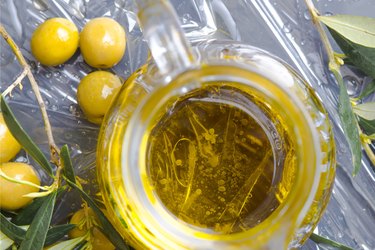
Olive oil is known as a healthy fat, but could it be good for acid reflux or gastroesophageal reflux disease (GERD)? Some people with acid reflux say the oil helps keep their stomach acids down. But the science? Not so clear.
As with most foods, when it comes to olive oil and acid reflux, you should see what works best for you — and use sparingly.
Video of the Day
Video of the Day
The Case for Olive Oil
The findings of an October 2016 study of 800-plus Albanian men and women in Diseases of the Esophagus starts to lay the case for olive oil for reflux, concluding that adhering to a Mediterranean diet lowered their risk of GERD.
And, per the Mayo Clinic, healthy fats — particularly olive oil — are a mainstay of the Mediterranean diet.
But if you have GERD, the International Foundation for Gastrointestinal Disorders (IFFGD) recommends you experiment to see what foods trigger your reflux and what foods help calm it.
One diet change that may work well, notes the IFFGD, is switching from saturated fats (usually found in meat and dairy) to unsaturated fats found in plants, fish, nuts and seeds (hence, the Mediterranean diet).
And if you're a fan of olive oil, then you'll likely be pleased to know this liquid fat derived from olives tops the IFFGD's list of recommended monounsaturated fats for your health.
So, does it matter which type of olive oil you choose (refined, virgin, extra virgin)?
"The difference between the types of olive oil is not a nutritional difference, but a taste difference," says York, Pennsylvania-based Julie Stefanski, RDN, LDN, a registered dietitian and nutritionist and spokesperson for the Academy of Nutrition and Dietetics.
Extra virgin olive oil (EVOO), for example, simply means it was created from the first pressing of a batch of olives, she explains. "This difference mainly affects how you use it in food preparation, not how it affects reflux symptoms."
Everything in Moderation
"When it comes to oil choices for reflux, it's really how much you use that is most important, and not necessarily the type," Stefanski says.
While you need some fat in your diet for your body's cells to function properly, Stefanski says, fats require the most amount of stomach acid to break down and digest. "Fatty foods take longer to leave the stomach than proteins or carbohydrates," she says. That means this combination of increased stomach acid and longer digestion time can lead to reflux symptoms in many people, she adds.
So, while you want some fat in your diet, you don't want so much that your body has trouble digesting it: "The amount of oils or fat you consume at one time is likely the most important reflux variable," Stefanski says.
Is there another oil that's better? Not necessarily. The American Heart Association (AHA) lists olive oil and other non-tropical vegetable oils — such as canola, corn and safflower oils — as good choices because they all contain healthy fats. The goal is to choose oils with less than 4 grams of saturated fat per tablespoon, according to the AHA.
Give Lemon a Go, Too
If you're looking to limit oil, lemon juice can be a good alternative for flavoring your vegetables or baked fish, Stefanski says.
But, as with olive oil, smaller amounts of lemon juice may be tolerated better than larger amounts: "Too much lemon juice may cause discomfort for those who already have reflux," she cautions, as it is acidic.
Eating or drinking acidic foods or beverages can irritate the delicate tissue of your esophagus, she explains, as can acidic reflux. And when your throat is already sore from irritation, acidic foods such as tomato products or citrus (lemon, orange, grapefruit) can cause pain and discomfort.
Get Creative With Cooking Methods
If you want to limit the amount of fat in your diet, experiment with different ways of cooking, Stefanski says. She suggests varying the amounts and types of oil to see if changing things up makes a difference for your GERD symptoms.
"Steaming and baking are typically going to be lower in overall fat and may be less irritating than using a lot of oil, like in fried foods," she says.
And, per the Mayo Clinic, olive oil is a good choice for sautéing because of its moderately high smoke point.
- Diseases of the Esophagus: “Adherence to a Predominantly Mediterranean Diet Decreases the Risk of Gastroesophageal Reflux Disease: A Cross-Sectional Study in a South Eastern European Population”
- International Foundation for Gastrointestinal Disorders: “Diet Changes for GERD”
- Mayo Clinic: “What Are MUFAs, and Should I Include Them in My Diet?”
- Julie Stefanski, MEd, RDN, CSSD, LDN, CDCES, FAND, dietitian and nutritionist, York, Pennsylvania; spokesperson, Academy of Nutrition and Dietetics
- American Heart Association: “Healthy Cooking Oils”
- Mayo Clinic: “Which Type of Oil Should I Use for Cooking With High Heat?”
Is this an emergency? If you are experiencing serious medical symptoms, please see the National Library of Medicine’s list of signs you need emergency medical attention or call 911.